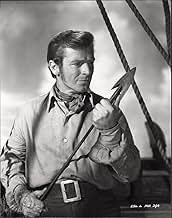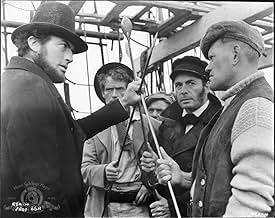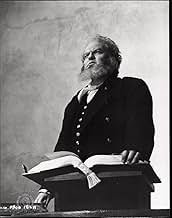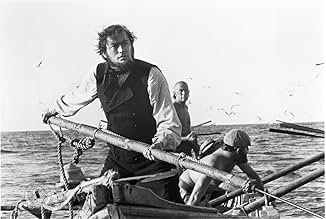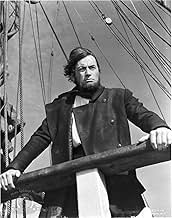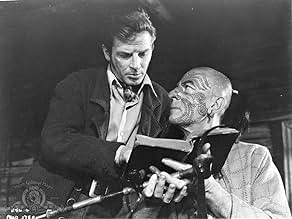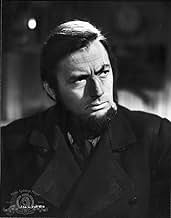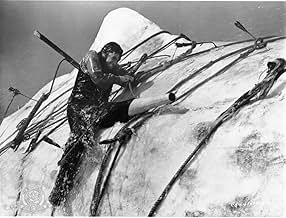AVALIAÇÃO DA IMDb
7,3/10
23 mil
SUA AVALIAÇÃO
O único sobrevivente de um navio perdido conta a história da obsessão autodestrutiva de seu capitão de caçar a baleia-branca, Moby Dick.O único sobrevivente de um navio perdido conta a história da obsessão autodestrutiva de seu capitão de caçar a baleia-branca, Moby Dick.O único sobrevivente de um navio perdido conta a história da obsessão autodestrutiva de seu capitão de caçar a baleia-branca, Moby Dick.
- Direção
- Roteiristas
- Artistas
- Prêmios
- 5 vitórias e 4 indicações no total
Friedrich von Ledebur
- Queequeg
- (as Friedrich Ledebur)
Tamba Allen
- Pip
- (não creditado)
Avaliações em destaque
This version of the Melville classic should, without question, be regarded as the penultimate screen adaptation of a masterwork of American fiction. Everything - absolutely everything - about this film works, from John Huston's brilliant direction, to the screenplay ( co-written by Ray Bradbury ), to the powerful and believable performances. Gregory Peck IS Ahab; if anyone defined and crystallized so megalomaniacal a character, it was Peck, hands down. Not that this should be interpreted as a slight to any of the supporting cast; it isn't. The casting is so good, in fact, that now we find it difficult, if not impossible, to view the supporting cast members in any other light, especially Frederich Ledebur: his choice by the producers as Queequeg was nothing if not dead on the money, as was the small but significant part of Elizah, as portrayed by Royal Dano. Granted, some liberties were taken with the book ( so what else is new? ), such as the squid being written out completely, but this was, and continues to be, necessary in order to make a movie that doesn't take five hours to play out. Yes, okay, it's a "Cliff's Notes" "Moby Dick", but if what you're after is good direction, outstanding ( one could say tour de force ) acting, and a tight screenplay, then this is the movie for you. Believe us, this is the one, NOT the remake with Patrick Stewart. Stewart's Ahab is basically Patrick Stewart playing Patrick Stewart playing Ahab or, to put it another way, Huston's "Moby Dick" needs to be remade about as badly as the rest of us need leukemia. 'Nuff said.
When John Huston was casting for Moby Dick he got to make it on condition that he get a name actor to play Ahab. He went to Gregory Peck who was surprised by the offer. Given his image and the roles he had played up to that time, Peck thought he'd be better cast as Starbuck the first mate. Nevertheless he agreed to do Ahab.
Peck got mixed reviews at the time, but over the course of 50 years his performance has gotten better with time. The film itself which was shot in Ireland and Wales has also aged well. It's a nice depiction of life on a whaling ship in the 1840s and the crew of the Pequod are nicely cast in their roles.
Orson Welles was set to do his own adaption of Moby Dick and canceled his film when he heard his friend John Huston was doing Moby Dick. Welles asked about doing Ahab, but was given the small role of Father Mapple, the minister who blesses the Pequod's voyage. In fact Huston gave Welles a free hand to do the scene as he saw fit and the results are gratifying.
Of course Herman Melville's novel is about obsession and vengeance. I've always thought the point of Moby Dick is that the evil white whale who Ahab so personalizes and demonizes is just a whale doing his whale thing trying to stay alive. It is in fact the whalers who hunt him and his kind. And Ahab losing his leg is what we would call an occupational accident. The evil is how Ahab seduces the whole crew into his own madness, even first mate Starbuck, played winningly by Leo Genn who is the voice of reason and civilization.
Other cast members to note are Harry Andrews as second mate Stub, Friedrich Ledebuhr as Queequeg the Pacific Islander harpooner, and of course Richard Basehart as Ishmael who tells the tale.
Peck got mixed reviews at the time, but over the course of 50 years his performance has gotten better with time. The film itself which was shot in Ireland and Wales has also aged well. It's a nice depiction of life on a whaling ship in the 1840s and the crew of the Pequod are nicely cast in their roles.
Orson Welles was set to do his own adaption of Moby Dick and canceled his film when he heard his friend John Huston was doing Moby Dick. Welles asked about doing Ahab, but was given the small role of Father Mapple, the minister who blesses the Pequod's voyage. In fact Huston gave Welles a free hand to do the scene as he saw fit and the results are gratifying.
Of course Herman Melville's novel is about obsession and vengeance. I've always thought the point of Moby Dick is that the evil white whale who Ahab so personalizes and demonizes is just a whale doing his whale thing trying to stay alive. It is in fact the whalers who hunt him and his kind. And Ahab losing his leg is what we would call an occupational accident. The evil is how Ahab seduces the whole crew into his own madness, even first mate Starbuck, played winningly by Leo Genn who is the voice of reason and civilization.
Other cast members to note are Harry Andrews as second mate Stub, Friedrich Ledebuhr as Queequeg the Pacific Islander harpooner, and of course Richard Basehart as Ishmael who tells the tale.
In the 1960s English professors and film critics delighted in bashing this film. The professors took the line that the movie wasn't Melville, while the critics dismissed Peck's interpretation of Captain Ahab as "stiff." Neither view holds up well today.
Huston's "Moby Dick" isn't the whole book, but what film is? Though he doesn't give you the breadth or the depth, Huston does deliver much of the spirit and heart of the novel. The production values are splendid and the supporting players outstanding. No one can top Orson Welles as Father Mapple, but Leo Genn's Starbuck comes close. My only complaint is with Richard Basehart, who was a good actor but at 42 much too old for Ishmael, who I believe is in his early 20s. Stray thought - I wonder what James Dean would have done with Ishmael?
As for Peck, who else could have attempted this role in the mid-50s? John Wayne? Gary Cooper? Let's be serious. Sterling Hayden (who actually was quite a sailor) had the proper face and frame, but Hayden was never a box office draw and likely wasn't considered. More to the point, Peck was a much better actor. Though a bit young for Ahab, he certainly conveys both the man's insanity and his magnetism, which of course are inseparable. In so many films ("Twelve O'Clock High", "Pork Chop Hill", "The Guns of Navarone"), Peck was nothing if not a leader. Here he leads convincingly, which is essential, for Ahab is not Captain Quegg. In spite of everything Ahab's men do not mutiny, they follow him down, and with Peck in the role you accept it. Was he stiff? Well, try walking around with a pegleg. You'll probably feel a bit stiff yourself. Better to call Peck's Ahab rigid and unflinching, qualities that are central to the character. I have not seen Patrick Stewart's interpretation, but I doubt his Ahab achieves either Peck's demonic fury or his stone-hearted resolve.
There have been few better films of life at sea and few better interpretations of classic literature. "Moby Dick" is a treasure grown richer with age.
Huston's "Moby Dick" isn't the whole book, but what film is? Though he doesn't give you the breadth or the depth, Huston does deliver much of the spirit and heart of the novel. The production values are splendid and the supporting players outstanding. No one can top Orson Welles as Father Mapple, but Leo Genn's Starbuck comes close. My only complaint is with Richard Basehart, who was a good actor but at 42 much too old for Ishmael, who I believe is in his early 20s. Stray thought - I wonder what James Dean would have done with Ishmael?
As for Peck, who else could have attempted this role in the mid-50s? John Wayne? Gary Cooper? Let's be serious. Sterling Hayden (who actually was quite a sailor) had the proper face and frame, but Hayden was never a box office draw and likely wasn't considered. More to the point, Peck was a much better actor. Though a bit young for Ahab, he certainly conveys both the man's insanity and his magnetism, which of course are inseparable. In so many films ("Twelve O'Clock High", "Pork Chop Hill", "The Guns of Navarone"), Peck was nothing if not a leader. Here he leads convincingly, which is essential, for Ahab is not Captain Quegg. In spite of everything Ahab's men do not mutiny, they follow him down, and with Peck in the role you accept it. Was he stiff? Well, try walking around with a pegleg. You'll probably feel a bit stiff yourself. Better to call Peck's Ahab rigid and unflinching, qualities that are central to the character. I have not seen Patrick Stewart's interpretation, but I doubt his Ahab achieves either Peck's demonic fury or his stone-hearted resolve.
There have been few better films of life at sea and few better interpretations of classic literature. "Moby Dick" is a treasure grown richer with age.
Some critics panned this pic when it came out - Peck too wooden, the script too cliched, etc, etc. Don't believe a word of it. I saw this one when I was 8 or 9, and for years I watched it every time it came on TV - even in B&W! Peck isn't wooden, he's intense and fascinating (my favorite scene: in his cabin, saying to Starbuck, "That bed is a coffin"). The language may sound stilted, but it's MELVILLE'S, and the cast sink into it with conviction.
Some critic (I don't know which) has said that Moby Dick (the book) is an "uncomfortable masterpiece" - or something like that - meaning that it's a hard pill to swallow. The movie is bound to be a hard pill for many viewers as well. But that's their loss. Huston's movie is a great big powerful thing - you believe in Peck's crazy passion, in Starbuck's gentleness, in Ishmael and Quequeg's bond, in the evil of the whale, even.
Another favorite sequence: the Pequot becalmed, the crew lying about under the intense sun, slowly going crazy. The climactic chase is superb and thrilling, of course; what it all adds up to is a film about the elements, and our relationship to them. The whale is just the biggest of a whole slew that constantly threaten to destroy us. Nature, our natures - all the things we fight against with our intelligence, that threaten to engulf us.
Beautiful film, one of Huston's best. I find the analogy with Hitler/Nazis in an earlier comment very interesting. Another would be with an earlier Huston film, The Treasure of the Sierra Madre - another film about people taking terrible chances for reasons that don't stand up to a lot of examination, whose biggest obstacle turns out to be themselves. By the way, will someone please rerelease Moby Dick in a restored version so we can get a really good look at all that glorious Technicolor?
Some critic (I don't know which) has said that Moby Dick (the book) is an "uncomfortable masterpiece" - or something like that - meaning that it's a hard pill to swallow. The movie is bound to be a hard pill for many viewers as well. But that's their loss. Huston's movie is a great big powerful thing - you believe in Peck's crazy passion, in Starbuck's gentleness, in Ishmael and Quequeg's bond, in the evil of the whale, even.
Another favorite sequence: the Pequot becalmed, the crew lying about under the intense sun, slowly going crazy. The climactic chase is superb and thrilling, of course; what it all adds up to is a film about the elements, and our relationship to them. The whale is just the biggest of a whole slew that constantly threaten to destroy us. Nature, our natures - all the things we fight against with our intelligence, that threaten to engulf us.
Beautiful film, one of Huston's best. I find the analogy with Hitler/Nazis in an earlier comment very interesting. Another would be with an earlier Huston film, The Treasure of the Sierra Madre - another film about people taking terrible chances for reasons that don't stand up to a lot of examination, whose biggest obstacle turns out to be themselves. By the way, will someone please rerelease Moby Dick in a restored version so we can get a really good look at all that glorious Technicolor?
It would be impossible to make a movie that came up to the standard of the novel "Moby-Dick", but this film does a fine job of capturing some of the most important themes, and of telling a selection of the key parts of the story in an interesting way. It would be a temptation for any film-maker to put the focus on the action and the special effects, and thus ruin the heart of the book by downplaying its themes, as so many recent films have done with other classic material. Instead, John Huston's version concentrates on bringing out many of the complex internal and external conflicts of Captain Ahab, in sketching the crew members and their reactions to Ahab's monomania, and in portraying the atmosphere of frequent tedium, growing tension, and occasional dread aboard the 'Pequod'.
Richard Basehart's mild, pleasant demeanor makes Ishmael an appropriate mirror for the events and characters on the ship. Gregory Peck does rather well in the very challenging role of Ahab. Ahab is one of the most carefully-designed and demanding characters in literature, and lesser actors would simply be an embarrassment in the part. On screen, there is much to Ahab that just does not come across, and Peck's performance has to be judged with that in mind.
Leo Genn makes his scenes as Starbuck count, and several of the other crew members are portrayed well, albeit in much smaller parts. As Father Mapple, Orson Welles has only one scene, but it is an important one, in that it sets up some of the vital themes of the story ahead. Welles was an ideal choice, and his scene in the church is one scene that does come up to the high standard of Melville's novel.
While there may indeed be some areas in which this version falls short, and it's fair to point them out, it would be pretty difficult to improve on it in a cinema version of the story. And if taken on its own, it fits together well, making generally good choices as to what material would fit together and would work on screen, and in using the photography and settings to create the right atmosphere. For those who appreciate the depth of the original story, this has more than enough to make it worth watching.
Richard Basehart's mild, pleasant demeanor makes Ishmael an appropriate mirror for the events and characters on the ship. Gregory Peck does rather well in the very challenging role of Ahab. Ahab is one of the most carefully-designed and demanding characters in literature, and lesser actors would simply be an embarrassment in the part. On screen, there is much to Ahab that just does not come across, and Peck's performance has to be judged with that in mind.
Leo Genn makes his scenes as Starbuck count, and several of the other crew members are portrayed well, albeit in much smaller parts. As Father Mapple, Orson Welles has only one scene, but it is an important one, in that it sets up some of the vital themes of the story ahead. Welles was an ideal choice, and his scene in the church is one scene that does come up to the high standard of Melville's novel.
While there may indeed be some areas in which this version falls short, and it's fair to point them out, it would be pretty difficult to improve on it in a cinema version of the story. And if taken on its own, it fits together well, making generally good choices as to what material would fit together and would work on screen, and in using the photography and settings to create the right atmosphere. For those who appreciate the depth of the original story, this has more than enough to make it worth watching.
Você sabia?
- CuriosidadesGregory Peck initially blamed the poor reviews of his performance on the script, which he felt contained "too much prose from the novel". However, he later acknowledged that he had been too young for the part at 38, since Captain Ahab was supposed to be an old man at the end of his career (Ahab's age, as implied in the book's chapter "The Symphony", is 58). He added, "The film required more. At the time, I didn't have more in me." and apologized to the screenwriters. Director John Huston admitted he didn't want Peck as Ahab, but had spoken very highly of him & was very satisfied with his performance.
- Erros de gravaçãoThe way the ship was moved away from the pier was incorrect. The crew is shown hauling a line from the pier. This would not make the ship move forward. To move a ship out of the harbor, it is therefore, necessary to provide something to pull against. A special anchor, called a kedging anchor, is carried as far from the ship as possible by the longboat and then dropped to the seabed. The remaining crew pull the ship out to it winding the line around the capstan or winch, and then it is hauled up and the process repeated as many times as necessary.
- Citações
Captain Ahab: From hell's heart I stab at thee; for hate's sake I spit my last breath at thee. Ye damned whale.
- Cenas durante ou pós-créditosThe film finishes with 'Finis' instead of the usual 'The End'.
- ConexõesEdited into De 7 Dødssyndene: Latskap (2007)
Principais escolhas
Faça login para avaliar e ver a lista de recomendações personalizadas
Detalhes
- Data de lançamento
- País de origem
- Idioma
- Também conhecido como
- Herman Melville's Moby Dick
- Locações de filme
- Youghal, County Cork, Irlanda(harbour: New Bedford - departure of The Pequod)
- Empresa de produção
- Consulte mais créditos da empresa na IMDbPro
Bilheteria
- Orçamento
- US$ 4.500.000 (estimativa)
- Faturamento bruto mundial
- US$ 353
- Tempo de duração1 hora 56 minutos
- Proporção
- 1.66 : 1
Contribua para esta página
Sugerir uma alteração ou adicionar conteúdo ausente



